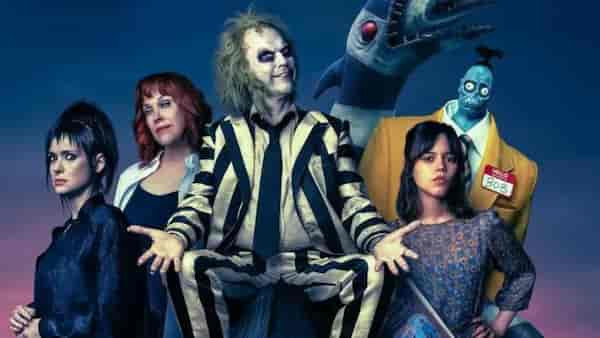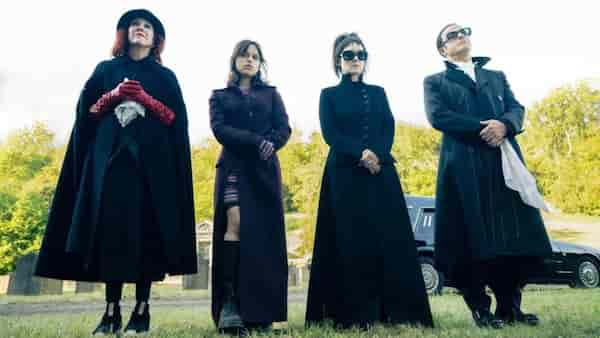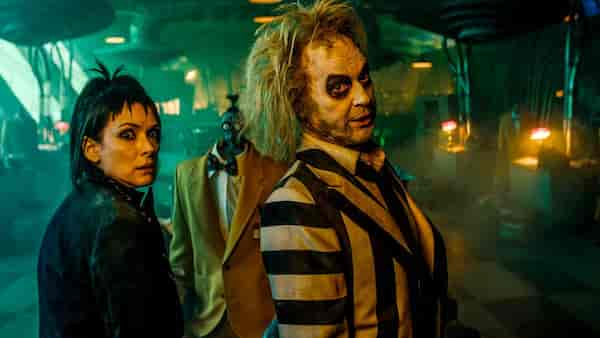Beetlejuice Beetlejuice: In Praise Of Pre-Internet Imagination
The film bounces around in all directions, no holds barred, like a cinematic pup that pees itself in excitement when it sees a human audience.

Promo poster for Beetlejuice Beetlejuice.
Last Updated: 05.02 PM, Sep 07, 2024
SOLELY as a movie sequel, Beetlejuice Beetlejuice is fun, frustrating and fun because it’s frustrating. It bounces around in all directions, no holds barred, like a cinematic pup that pees itself in excitement when it sees a human audience. 36 years after the (events of the) first film, the ‘plot’ is a shapeless flubber composed entirely of director Tim Burton’s eccentricities. Former gothic teen Lydia Deetz (Winona Ryder) now hosts a supernatural talk show, has a producer boyfriend (Justin Theroux), and an estranged teen daughter, Astrid (Jenna Ortega), who thinks her celebrity mom is a bit of a scam.
The hook is the same: Betelgeuse (Michael Keaton), the crass ghost and bio-exorcist who almost married Lydia to attain life in the first film, continues to haunt her. He still wants to marry her. When the broken family – including Lydia’s stepmother Delia (Catherine O’Hara, in Moira mode) – returns to the house for a funeral, things follow a familiar pattern. Astrid falls for a boy who is hiding a secret, Lydia again agrees to marry Betelgeuse in return for his help during a crisis, and the sandworms appear when the story paints itself into a corner.

Only, it’s more congested this time. The newer characters are around for vibes. They serve no real purpose. There’s Willem Dafoe’s Wolf Jackson, a ghost detective who used to be a B-movie star in life. There’s Rory, Lydia’s woke and needy boyfriend who fits the profile of a social media predator (“trauma” and “masculinity” are his favourite words). And there’s Delores, played by the eternal Monica Bellucci, a stitched-up villain who’s out to exact revenge on ex-husband Betelgeuse. One can’t help but notice that she’s a Burton-crafted sexual innuendo: She is a ‘soul-sucking’ witch who reduces people to floppy foreskin-like pancakes with an open mouth, and her intro features different body parts (she was hacked to death) being stapled together in a perversely erotic sequence. Look closer and you’ll see Bellucci moan with every staple.
Which is to say: The irreverence of Beetlejuice Beetlejuice is almost childish. For example, a “soul train” that carries the recently deceased to the great beyond is literally a party train marked by joyous African American dancers and soul music on the platform. Lydia’s late father finds himself in the bureaucratic afterlife corridors headless because he was mauled by a shark; a torso-less surfer seated next to him nods in approval. The flashback of Betelgeuse and his twisted wife is black-and-white and dubbed in Italian. Even Lydia’s late ex-husband, whose body was never found in the Amazon, emerges in the afterlife with little piranhas nibbling away at his flesh.
The inherent darkness keeps trading the film’s edge for morbid humour. The only thing political about it is its political incorrectness. There’s mention of “another protestor” about the latest arrival. The murdered parents of a boy cheerfully appear with an axe and knife in their faces. A janitor who committed suicide – cue Danny DeVito cameo – has varnish around his mouth. It’s droll to watch, but this tends to rob the world-building of its soul. There’s never enough at stake – emotionally, narratively – when the living and dead make deals with each other. Heavy themes like grief and longing and love are dodged and reframed as visual gimmicks. At one point, mother and daughter reunite after nearly losing each other forever, but the gravity of the moment is lost to the language of levity. It’s like Burton is so afraid to get serious that his hyper-escapism blunts the heart. The personality hijacks the humanity of the film.

But as a genre movie – a fabled horror comedy in present-day America – Beetlejuice Beetlejuice is a remarkable achievement. What Tom Cruise is to the modern action spectacle, Tim Burton is to fantasy storytelling. His oddball vision is a charming analogue instrument in a digital world. So much of the film resists cutting-edge VFX in favour of practical effects, cartoonish and stagey production design, old-school animation and strange stop-motion monsters. (You can see where auteurs like Michel Gondry and Wes Anderson might have derived their inspiration from). Burton’s goth-operatic style has never changed in the face of an over-evolved and over-produced studio landscape.
This vintage imagination – and the interplay between big-screen antiquity and streaming-age creativity – is an integral part of the premise. Astrid, played by Ortega (who starred in CGI-heavy Netflix hit Wednesday), is a nostalgia sceptic of sorts. She hates her mother because she doesn’t believe in Lydia’s retro-ness, not just her tales of ghosts and ghouls. She is essentially a social media kid who scoffs at the hand-scribbled inventiveness of what Tim Burton represents. It’s also a version of the generational gap between Ortega and Ryder, two actresses at opposite ends of one mood spectrum. That Astrid needs to be rescued by Lydia is a testament to the filmmaker’s purism. It’s almost romantic that he chose 2024 to make a 1980s sequel. The best part is that it never feels like a defiant statement or an uncompromising antidote to the Marvel-ization of creativity. It’s just a mad-hatter director staying true to himself. This is who he is. For some, the irreverence is childish. For others, it’s childlike. It dares to preserve the innocence many of us lose in the scuffle between growing and growing up.

 Premium
Premium